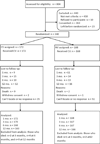Treating Smokers in Substance Treatment With Contingent Vouchers, Nicotine Replacement and Brief Advice Adapted for Sobriety Settings
- PMID: 27658756
- PMCID: PMC5154824
- DOI: 10.1016/j.jsat.2016.08.012
Treating Smokers in Substance Treatment With Contingent Vouchers, Nicotine Replacement and Brief Advice Adapted for Sobriety Settings
Abstract
Treatment for substance use disorders (SUD) provides an opportunity to use voucher-based treatment for smoking. Nicotine replacement (NRT) could improve outcomes previously observed with vouchers without NRT.
Methods: A randomized controlled trial compared contingent vouchers (CV) for smoking abstinence to noncontingent vouchers (NV), when all received counseling and NRT. Smokers who had not sought smoking treatment (n=340) in residential SUD treatment were provided 14days of vouchers for complete smoking abstinence per exhaled carbon monoxide (CO) after a 5-day smoking reduction period, or vouchers only for breath samples, plus brief advice (four sessions) and 8weeks of NRT.
Results: Within treatment, 20% had complete abstinence with CV, 5% with NV (p<.001), and participants showed 50% of days abstinent in CV compared to 22% in NV (p<.001). Across 1, 3, 6 and 12months after randomization, CV resulted in significantly fewer cigarettes per day (p<.01) and fewer days smoking (p<.01), but with small effects. Point-prevalence abstinence differences across follow-up (e.g., 4% CV, 2% in NV at 6 and 12months) were not significant. No differences in substance use were seen.
Conclusions: Within-treatment effects on abstinence are stronger than in a prior study of the same CV with BA but without NRT, but NRT does not improve abstinence after vouchers end. Implications for voucher-based treatment include investigating effects when combined with stronger smoking medications and using motivational interviewing. Smoking treatment does not harm SUD recovery.
Keywords: Brief advice; Contingency management; Contingent vouchers; Financial incentives; Nicotine dependence; Nicotine replacement; Point-prevalence abstinence; Smoking cessation; Substance use disorders.
Published by Elsevier Inc.
Figures
References
-
- Asher MK, Martin RA, Rohsenow DJ, MacKinnon SV, Traficante R, Monti PM. Perceived barriers to quitting smoking among alcohol dependent patients in treatment. Journal of Substance Abuse Treatment. 2003;24:169–174. - PubMed
-
- Benowitz NL. Cotinine disposition and effects. Clinical and Pharmacology Therapeutics. 1983;34:604–611. - PubMed
-
- Bien TH, Burge R. Smoking and drinking: A review of the literature. International Journal of Addictions. 1991;25:1429–1454. - PubMed
Publication types
MeSH terms
Grants and funding
LinkOut - more resources
Full Text Sources
Other Literature Sources
Medical


